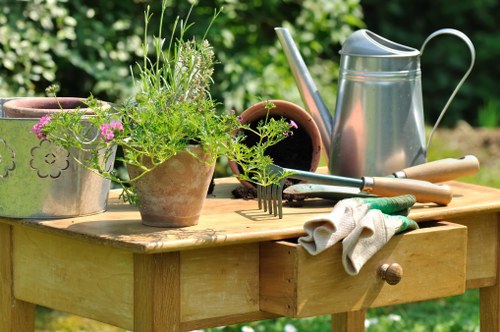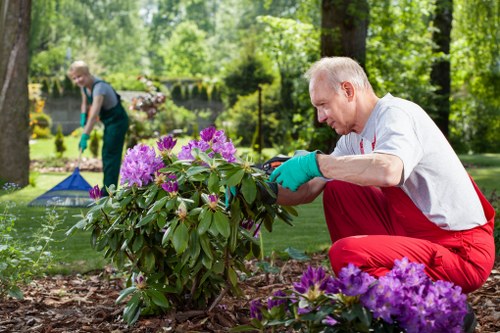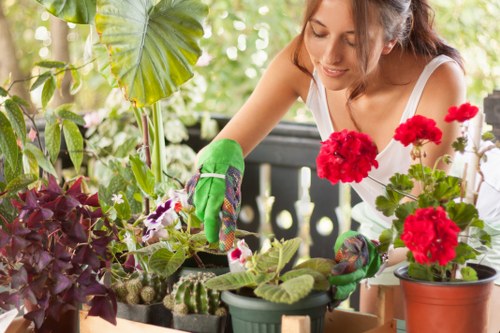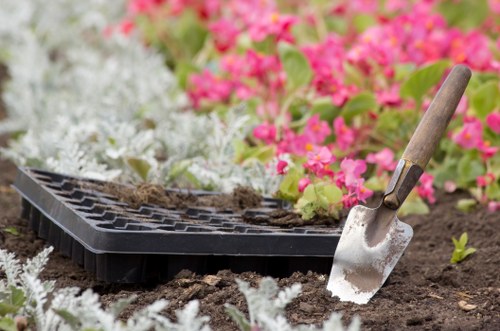Garden Maintenance in Stoke Newington

Maintaining a beautiful garden in Stoke Newington requires a combination of passion, knowledge, and regular upkeep. Whether you're a seasoned gardener or just starting out, understanding the unique climate and soil conditions of Stoke Newington can help you cultivate a thriving outdoor space.
One of the first steps in effective garden maintenance is ensuring that your plants receive the right amount of sunlight. Stoke Newington enjoys a temperate climate, with ample sunshine during the growing seasons. However, it's essential to consider the specific needs of each plant species to optimize their growth and health.
Proper watering is another critical aspect of garden maintenance. Overwatering can lead to root rot, while underwatering may cause plants to wilt and die. Implementing a consistent watering schedule and utilizing efficient irrigation systems can make a significant difference in the vitality of your garden.

Essential Garden Maintenance Tips
To keep your garden in Stoke Newington looking its best, consider the following maintenance tips:
- Regular Pruning: Trim back overgrown branches and dead foliage to encourage healthy growth and improve the overall appearance of your plants.
- Weed Control: Remove weeds promptly to prevent them from competing with your desired plants for nutrients and water.
- Soil Health: Test your soil regularly and amend it with compost or other organic matter to ensure it remains fertile and well-drained.
- Pest Management: Monitor your garden for signs of pests and diseases, and take appropriate measures to protect your plants.
Implementing these strategies can help you maintain a vibrant and healthy garden throughout the year.

Seasonal Maintenance Tasks
Different seasons bring unique challenges and opportunities for garden maintenance in Stoke Newington. Here's a breakdown of essential tasks for each season:
Spring
Spring is the perfect time to prepare your garden for the growing season. Start by clearing out any debris from the winter months and inspecting your plants for any damage. Plant new flowers and vegetables, and apply a balanced fertilizer to promote robust growth.
Summer
During the summer, focus on consistent watering and pest control. Mulching can help retain moisture in the soil and suppress weed growth. Regularly deadhead flowers to encourage continuous blooming.
Autumn
Autumn is ideal for harvesting remaining produce and preparing your garden for the colder months. Rake fallen leaves and compost them to enrich your soil. Plant hardy perennials that can withstand frost and chilly temperatures.
Winter
In winter, protect vulnerable plants from frost by using protective coverings. Prune trees and shrubs to maintain their shape and remove any damaged limbs. Plan for next year's garden by researching new plant varieties and designing your layout.

Choosing the Right Plants for Stoke Newington
Selecting plants that are well-suited to the Stoke Newington climate is crucial for a successful garden. Consider native species that have adapted to the local conditions and require less maintenance.
- Roses: Thrive in full sun and well-drained soil, providing beautiful blooms throughout the summer.
- Lavender: Prefers sunny locations and dry conditions, offering fragrant purple flowers.
- Hostas: Ideal for shaded areas, with lush foliage in various shades of green and variegated patterns.
- Boxwood: A versatile shrub that can be shaped into hedges or topiaries, suitable for both sun and partial shade.
Incorporating a variety of plants with different textures and colors can add depth and interest to your garden.

Professional Garden Maintenance Services
For those who prefer to leave garden maintenance to the experts, Stoke Newington offers a range of professional services. Hiring a skilled gardener can ensure that your outdoor space receives the attention it needs, allowing you to enjoy a beautiful garden without the hassle.
Benefits of Hiring Professionals
- Expertise: Professionals bring a wealth of knowledge and experience, ensuring that your garden is maintained to the highest standards.
- Time-Saving: Outsourcing maintenance tasks frees up your time to focus on other priorities.
- Customized Care: Tailored maintenance plans address the specific needs of your garden, promoting optimal health and growth.
Whether you require regular maintenance or seasonal clean-ups, professional services can provide the support you need to keep your garden in pristine condition.

Sustainable Gardening Practices
Adopting sustainable practices in your garden not only benefits the environment but also enhances the health and longevity of your plants. Here are some eco-friendly gardening tips for Stoke Newington:
- Composting: Recycle kitchen scraps and garden waste to create rich compost that enriches your soil.
- Rainwater Harvesting: Collect rainwater to use for irrigation, reducing water consumption and utility bills.
- Native Plants: Choose native species that require less water and are more resistant to local pests and diseases.
- Organic Pest Control: Use natural predators and organic treatments to manage pests without harmful chemicals.
Implementing these sustainable methods can lead to a more resilient and environmentally friendly garden.

Tools and Equipment for Garden Maintenance
Having the right tools is essential for efficient garden maintenance. Invest in quality equipment that will make your gardening tasks easier and more effective.
Essential Tools
- Pruning Shears: For trimming and shaping plants with precision.
- Garden Fork: Useful for turning soil and aerating garden beds.
- Hose with Adjustable Nozzle: Provides flexibility in watering different areas of your garden.
- Wheelbarrow: Makes transporting soil, plants, and debris more manageable.
Maintaining your tools in good condition also ensures their longevity and performance.

Creating a Maintenance Schedule
Developing a structured maintenance schedule helps keep your garden organized and ensures that no tasks are overlooked. Here's how to create an effective schedule:
- Assess Your Garden: Identify the specific needs of your plants and the tasks required to maintain them.
- Prioritize Tasks: Determine which maintenance activities are most critical and address them accordingly.
- Set Regular Intervals: Assign specific days or weeks for tasks like watering, weeding, and pruning.
- Monitor Progress: Keep track of your garden's health and adjust the schedule as needed based on seasonal changes.
A well-planned maintenance schedule can make garden upkeep more manageable and ensure consistent care throughout the year.

Enhancing Garden Aesthetics
Beyond basic maintenance, enhancing the aesthetics of your garden can create a more inviting and enjoyable outdoor space. Consider the following ideas:
Garden Design
Thoughtful garden design incorporates elements like pathways, seating areas, and focal points to create a harmonious layout. Use a mix of plant heights and textures to add visual interest.
Lighting
Outdoor lighting can highlight key features of your garden and extend its usability into the evening hours. Solar-powered lights are an eco-friendly option that requires minimal maintenance.
Decorative Features
Incorporate items like sculptures, birdbaths, and water features to add character and charm to your garden.
By focusing on both maintenance and design, you can create a space that is both beautiful and functional.

Preventative Measures for Garden Health
Implementing preventative measures can help avoid common garden problems and ensure the long-term health of your plants. Here are some strategies to consider:
- Regular Inspections: Frequently examine your plants for signs of disease or pest infestation, allowing for early intervention.
- Crop Rotation: If you have a vegetable garden, rotating crops each season can prevent soil depletion and reduce pest buildup.
- Proper Spacing: Ensure plants are adequately spaced to promote airflow and reduce the risk of fungal infections.
- Healthy Soil: Maintaining nutrient-rich soil enhances plant resilience against stressors.
These preventative practices contribute to a robust and thriving garden environment.

Mulching Techniques
Mulching is a valuable practice in garden maintenance, offering several benefits such as moisture retention, temperature regulation, and weed suppression. Here are some effective mulching techniques:
Choosing the Right Mulch
Select a mulch type that suits your garden's needs. Organic mulches like wood chips, straw, and compost add nutrients to the soil as they decompose, while inorganic options like gravel or rubber mulch offer durability and minimal maintenance.
Application Methods
Apply mulch in a thickness of 2-3 inches around your plants, ensuring not to pile it against plant stems or tree trunks. This helps prevent rot and allows for proper air circulation.
Seasonal Maintenance
Refresh mulch annually to maintain its effectiveness. Remove any decomposed material and add a fresh layer as needed.
Proper mulching enhances the overall health and appearance of your garden.

Composting for a Healthier Garden
Composting is an eco-friendly way to recycle organic waste and enrich your garden soil. Here's how to get started with composting in Stoke Newington:
Setting Up a Compost Bin
Choose a compost bin that suits your space and needs. Ensure it has proper ventilation and is easily accessible for regular maintenance.
What to Compost
Include kitchen scraps like vegetable peels, coffee grounds, and eggshells, as well as yard waste such as grass clippings, leaves, and small branches. Avoid adding meat, dairy, or oily foods to prevent unpleasant odors and pests.
Maintaining Your Compost
Turn your compost regularly to aerate it and speed up the decomposition process. Keep the compost moist but not soggy, similar to the consistency of a damp sponge.
Using Compost in Your Garden
Once the compost has fully decomposed into dark, crumbly material, use it to amend your soil, improve plant health, and boost nutrient levels.
Composting not only benefits your garden but also reduces household waste, contributing to a more sustainable environment.

Water Conservation Strategies
Water conservation is essential for sustainable garden maintenance, especially during dry spells. Implementing water-saving strategies can help preserve this valuable resource while keeping your garden healthy.
Drip Irrigation
Drip irrigation systems deliver water directly to the plant roots, minimizing evaporation and runoff. This method ensures that plants receive the optimal amount of water efficiently.
Rainwater Collection
Set up rain barrels or other collection systems to gather rainwater from your roof. Use this water for irrigating your garden, reducing reliance on municipal water sources.
Plant Selection
Choose drought-resistant plants that require less water and are better suited to Stoke Newington's climate. Native species often thrive with minimal irrigation.
Mulching
As previously mentioned, mulching helps retain soil moisture, reducing the need for frequent watering.
By adopting these water conservation techniques, you can maintain a lush garden while being mindful of environmental resources.

Soil Testing and Amendment
Understanding your garden's soil composition is fundamental to successful plant growth. Regular soil testing and appropriate amendments can create an optimal environment for your plants.
Performing Soil Tests
Use a soil testing kit or consult with a local garden center to determine your soil's pH level, nutrient content, and texture. This information will guide your soil amendment strategies.
Amending Soil Based on Test Results
If your soil is too acidic or alkaline, adjust the pH by adding lime or sulfur accordingly. Incorporate organic matter like compost to improve soil structure, drainage, and fertility.
Fertilization
Apply fertilizers based on your soil test results to provide essential nutrients. Organic fertilizers offer a slow-release option that benefits soil health over time.
Improving Soil Structure
Enhance soil aeration and water retention by mixing in materials such as perlite, vermiculite, or peat moss. This creates a balanced environment for root development.
Maintaining healthy soil is the cornerstone of a productive and vibrant garden.

Pest and Disease Management
Protecting your garden from pests and diseases is crucial for maintaining plant health. Implementing integrated pest management (IPM) strategies can help control issues effectively and sustainably.
Identification
Early identification of pests and diseases allows for prompt and targeted interventions. Regularly inspect your plants for signs of infestation or illness, such as discolored leaves, spots, or unusual growth patterns.
Biological Controls
Encourage beneficial insects like ladybugs and lacewings that prey on common garden pests. Introducing these natural predators can help keep pest populations in check.
Cultural Practices
Implementing good garden hygiene, such as removing plant debris and avoiding over-fertilization, can reduce the likelihood of disease outbreaks.
Chemical Treatments
When necessary, use targeted and eco-friendly pesticides to manage severe infestations. Always follow application guidelines to minimize environmental impact.
By adopting a comprehensive approach to pest and disease management, you can maintain a healthy and flourishing garden.

Pruning and Trimming Techniques
Proper pruning and trimming are essential for shaping plants, promoting growth, and maintaining plant health. Here are some best practices for effective pruning:
When to Prune
Different plants have specific pruning schedules. Generally, it's best to prune in late winter or early spring before new growth begins. However, some flowering plants may require pruning after blooming.
Tools and Techniques
- Sharp Tools: Use clean, sharp pruners or shears to make precise cuts and reduce the risk of disease transmission.
- Proper Cutting: Make cuts at a 45-degree angle, just above a bud or branch junction, to encourage healthy regrowth.
- Removing Dead or Diseased Branches: Eliminate any compromised branches to prevent the spread of pests and diseases.
Shaping Plants
Prune to achieve the desired shape and size of your plants. Regular trimming helps maintain an attractive appearance and prevents plants from becoming overgrown.
Mastering pruning techniques ensures that your plants remain healthy, productive, and aesthetically pleasing.

Mulch Maintenance
Maintaining mulch layers is important for sustaining their benefits in your garden. Here's how to keep mulch effective:
Replenishing Mulch
Over time, mulch breaks down and may need to be replenished. Add a fresh layer annually to maintain its moisture retention and weed suppression properties.
Preventing Compaction
Avoid letting mulch become compacted, as this can hinder water infiltration and root growth. Turn the mulch gently to maintain its structure.
Organic Mulch Management
For organic mulches, ensure that they decompose evenly by turning or fluffing them periodically. This promotes soil enrichment and aeration.
Aesthetic Considerations
Maintain a uniform appearance by spreading mulch evenly across your garden beds, avoiding bare spots or uneven piles.
Regular mulch maintenance enhances the functionality and visual appeal of your garden.

Lawn Care in Stoke Newington Gardens
A well-maintained lawn is the centerpiece of many Stoke Newington gardens. Proper lawn care involves mowing, fertilizing, aerating, and pest control to keep your grass lush and healthy.
Mowing Techniques
Mow your lawn regularly, keeping the grass at an optimal height of about 2.5 to 3.5 inches. Avoid cutting more than one-third of the grass blade at a time to prevent stress.
Fertilization
Apply a balanced lawn fertilizer in the spring and fall to provide essential nutrients. Organic fertilizers can improve soil health and promote vigorous growth.
Aeration
Aerate your lawn annually to relieve soil compaction and enhance water and nutrient penetration. This process involves perforating the soil with small holes to allow better air circulation.
Pest and Weed Control
Monitor your lawn for pests like grubs and apply appropriate treatments when necessary. Use herbicides or manual removal methods to control weed growth.
Consistent lawn care practices result in a vibrant and resilient lawn that enhances the overall beauty of your garden.

Planting and Transplanting Strategies
Effective planting and transplanting are key to establishing a strong and diverse garden. Here are some strategies to ensure successful growth:
Choosing the Right Time
Plant your flowers, vegetables, and shrubs during their recommended seasons to maximize growth potential. Early spring and late summer are typically ideal times for most plants.
Proper Plant Spacing
Ensure adequate spacing between plants to allow for air circulation and prevent overcrowding. This reduces competition for resources and minimizes disease risk.
Transplanting Established Plants
When transplanting, dig a wide and deep hole to accommodate the root system. Gently loosen the roots before placing the plant in the new location and fill the hole with nutritious soil.
Supporting Young Plants
Use stakes or supports for young or tall plants to prevent them from toppling over and to encourage straight growth.
Implementing these planting and transplanting techniques ensures a robust and flourishing garden.

Winterizing Your Garden
Preparing your garden for the winter months is essential to protect plants and ensure a healthy start in the spring. Here are some winterizing tips for Stoke Newington gardens:
Protecting Plants
Use frost covers or blankets to shield sensitive plants from freezing temperatures. Mulch around the base of plants to insulate roots and retain soil warmth.
Pruning
Prune deciduous trees and shrubs during the dormant season to shape them and remove any damaged branches. Avoid heavy pruning, which can make plants more susceptible to winter damage.
Cleaning Garden Beds
Remove fallen leaves and debris from garden beds to prevent the spread of pests and diseases. Compost healthy plant material and dispose of any diseased parts.
Tool Maintenance
Clean and store garden tools properly to prevent rust and damage. Sharpen blades and apply oil to metal parts before storing.
Planning for Spring
Use the winter months to plan and design your garden layout for the upcoming year. Order seeds and plants in advance to ensure availability.
By taking these winterizing steps, you can safeguard your garden and promote a successful growing season ahead.

Attracting Wildlife to Your Garden
A garden that attracts wildlife adds life and diversity to your outdoor space. Here are some ways to entice beneficial creatures to your Stoke Newington garden:
Bird-Friendly Features
Install bird feeders, birdhouses, and water sources to provide food and shelter for various bird species. Plant native shrubs and trees that offer natural nesting sites.
Pollinator Gardens
Create a pollinator-friendly area by planting flowers rich in nectar and pollen, such as lavender, sunflowers, and bee balm. Avoid using pesticides that can harm pollinators.
Butterfly and Moth Habitats
Provide host plants for caterpillars and nectar sources for adult butterflies and moths. Milkweed, fennel, and butterfly bush are excellent choices.
Invertebrate Support
Encourage beneficial insects like ladybugs and dragonflies that help control pest populations. Incorporate rock piles or log stacks to offer habitats for these creatures.
Fostering a wildlife-friendly garden enhances biodiversity and creates a vibrant ecosystem that benefits all its inhabitants.

DIY Garden Maintenance Projects
Engaging in DIY garden maintenance projects can be both rewarding and cost-effective. Here are some projects you can undertake in your Stoke Newington garden:
Building Raised Beds
Create raised garden beds using timber or stone to improve soil drainage and make planting more accessible. Raised beds also help control weeds and reduce soil compaction.
Creating a Compost Bin
Construct a simple compost bin using recycled materials. This allows you to recycle garden waste and enrich your soil naturally.
Installing a Rainwater Harvesting System
Set up rain barrels to collect rainwater for use in your garden. This sustainable practice conserves water and reduces utility costs.
Constructing Garden Paths
Build decorative paths using materials like gravel, stepping stones, or mulch. Paths guide visitors through your garden and prevent soil erosion.
Building a DIY Greenhouse
Extend your growing season by constructing a small greenhouse. This provides a controlled environment for starting seeds and protecting sensitive plants.
These DIY projects enhance the functionality and beauty of your garden while allowing you to personalize your outdoor space.

Utilizing Technology in Garden Maintenance
Modern technology offers innovative solutions to simplify garden maintenance. Here are some tech-savvy tools and gadgets to consider:
Smart Irrigation Systems
Automate your watering schedule with smart irrigation systems that adjust based on weather conditions, ensuring optimal moisture levels for your plants.
Garden Monitoring Sensors
Use soil moisture sensors and weather stations to monitor the health of your garden. These devices provide real-time data to inform your maintenance practices.
Garden Management Software
Manage planting schedules, track growth progress, and organize garden tasks with specialized software or mobile apps tailored for gardeners.
Robotic Lawn Mowers
Invest in a robotic lawn mower to maintain an even and well-manicured lawn with minimal effort. These devices can be programmed to operate on a regular schedule.
LED Grow Lights
Enhance plant growth indoors or in shaded areas with energy-efficient LED grow lights that provide the necessary spectrum for photosynthesis.
Incorporating technology into your garden maintenance routine can increase efficiency, save time, and improve overall garden health.

Eco-Friendly Pest Deterrents
Protecting your garden from pests without harming the environment is achievable with eco-friendly deterrents. Here are some methods to consider:
Nutrient-Rich Plants
Some plants naturally repel pests. Incorporate herbs like rosemary, basil, and mint, which deter insects with their strong fragrances.
Physical Barriers
Use nets, row covers, or garden fleece to shield plants from pests. These barriers prevent insects from reaching your plants while allowing air and light to pass through.
Natural Predators
Encourage beneficial insects, such as predatory beetles and parasitic wasps, which help control pest populations naturally.
Homemade Sprays
Create homemade insecticidal sprays using ingredients like neem oil, garlic, or soap. These solutions can effectively manage pests without toxic chemicals.
Companion Planting
Plant complementary species together to create a balanced ecosystem. Companion planting can deter pests, attract pollinators, and improve plant health.
Adopting eco-friendly pest deterrents ensures a healthy garden environment while preserving the natural balance.

Gardening for Different Spaces
Whether you have a spacious backyard or a compact balcony, effective garden maintenance can be achieved in any space. Here are tips for gardening in various environments:
Backyard Gardens
Utilize the ample space to create diverse planting areas, including flower beds, vegetable patches, and ornamental shrubs. Incorporate pathways and seating areas to enhance functionality and aesthetics.
Small Urban Gardens
Maximize limited space with container gardening, vertical planters, and hanging baskets. Choose compact and dwarf plant varieties that thrive in confined areas.
Balcony and Rooftop Gardens
Create a serene oasis with potted plants, railing planters, and compact seating. Ensure proper drainage and consider wind protection for rooftop gardens.
Indoor Gardens
Maintain indoor plants by providing adequate light, humidity, and ventilation. Use grow lights and regular maintenance to keep your indoor garden healthy.
Community Gardens
Participate in community gardening initiatives to share resources, knowledge, and space with fellow gardening enthusiasts in Stoke Newington.
Regardless of the space available, thoughtful planning and maintenance can result in a beautiful and thriving garden.

Conclusion
Effective garden maintenance in Stoke Newington involves a blend of regular care, informed practices, and a passion for cultivating nature. By implementing the tips and strategies outlined in this guide, you can ensure that your garden remains vibrant, healthy, and beautiful throughout the year.
Whether you choose to maintain your garden independently or enlist the help of professional services, the key to success lies in consistent effort and a willingness to adapt to the changing seasons and conditions.
Start your garden maintenance journey today and transform your outdoor space into a flourishing haven that brings joy and tranquility to your life.
Contact us today to book your garden maintenance service and take the first step towards a stunning Stoke Newington garden!